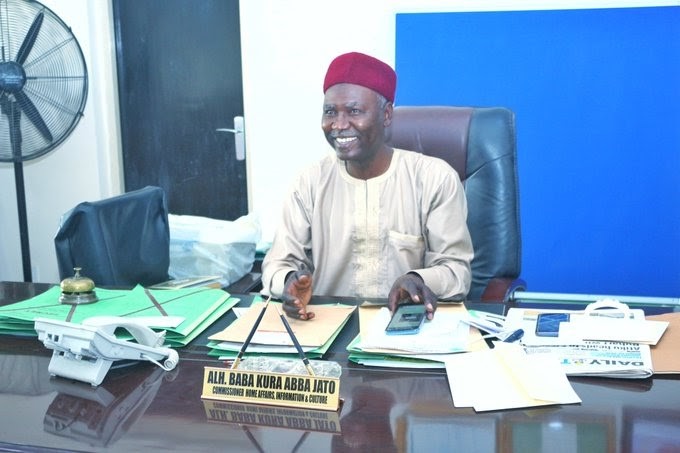We’ve Not Seen ‘Repentant’ BH Members Return To Old Ways, Says Borno Commissioner

The Borno State government cannot openly disapprove of the Operation Safe Corridor (OSC) programme unless it has “unimpeachable evidence” that those rehabilitated engaged in criminal acts or fomented mischief, says the Commissioner of Home Affairs, Information and Culture, Babakura Abbajato.
“As for now, we have not heard any story that the deradicalised are committing the same crimes for which they were arrested in the first place,” he added in his response to questions from HumAngle.
His statement appears to contradict the claim of Ali Ndume, a Borno lawmaker who chairs the Senate Committee on the Army.
He had said in November that the murder of Colonel Dahiru Bako, one of the commanders of Operation Lafiya Dole, was committed by a repentant Boko Haram member. The federal lawmaker similarly claimed in July that one of OSC’s clients killed his father and went away with his money after his reintegration.
OSC was launched by the Defence Headquarters in 2016 to deradicalise former Boko Haram members and reintegrate them back into society. Hundreds have so far been released from the programme in about four batches.
Abbajato said even though it was expected that people would have misgivings about the programme, they should understand that not all OSC participants were insurgents.
“Many of them are just those who were at the wrong place at the wrong time. Secondly, some were Boko Haram, of which the number of those believed to be Boko Haram is not as much as the number of non-Boko Haram,” he noted.
“But no matter how big or small the number is, it is not going to be easy for one to see someone that he or she knows has taken the life or disabled a very close relation, returning to the communities and feel okay with it.”
He urged victims of the ongoing insurgency to forgive according to the dictates of the Islamic and Christian faiths, but acknowledged that this would only work if the former militants did not return to their old habits.
He moved to cite the advantages of the Federal Government programme, especially that it provides incentives to current Boko Haram members to lay down their arms.
“No matter how we fight and throw bombs etc, war must end up at the reconciliation table,” he asserted.
“However, the concern that is being raised by those in the IDP [Internally Displaced People] camps need to be addressed seriously, otherwise, we are going to get back to square one. They need to be sensitised. The communities need to be hundred per cent sure that the ex-combatants would not infiltrate their communities and become informants to those who are in the bush.”
“It is not easy for the people, especially those in the local communities to wake up one day and see the very persons who caused the deaths and destructions being returned and even empowered by government,” the commissioner admitted.
He agrees that reintegration of former militants should only be done when the war has ceased and all terrorists have surrendered to the state, but adds that this is only his personal view and does not reflect the government’s position.
“At that stage, there should be a national reconciliation programme. Thereafter they can be reoriented and trained with skills for business and then reintroduced back to the society,” he suggested.
“But with the way it is presented, the insurgents surrender in batches; which means the war is still on. The best one could do for these surrendered fighters is to give them the training for skills and keep them in a confined area, not necessarily their former communities. If they have wares to sell from the skills they acquire, it can be taken into the common market for people to buy.”
Alternatively, he said, they can be relocated to communities where they will not have to interact with people who have been adversely affected by the terrorist group’s activities.
On plans to compensate people who have lost loved ones and valuables to the insurgency, the commissioner said it was the responsibility of the Federal Government and beyond the scope of any state government.
He pointed out that the Borno state government had been assisting IDPs across various camps in Monguno, Banki, Bama, and various other communities, and also those in neighbouring countries such as Cameroon and the Niger Republic.
“The Borno state government still extends its hands of support for the refugees living out there. Relief materials being taken to them almost on monthly bases are enough for the government to contain their immediate need,” he said.
“But as for compensations that need to be done, I think it is the responsibility of the federal government. It is not a new thing to be done. The Federal Government has done some in the Niger Delta; so it could still be done here in the Northeast.”
Additional reporting by Abdulkareem Haruna.
Support Our Journalism
There are millions of ordinary people affected by conflict in Africa whose stories are missing in the mainstream media. HumAngle is determined to tell those challenging and under-reported stories, hoping that the people impacted by these conflicts will find the safety and security they deserve.
To ensure that we continue to provide public service coverage, we have a small favour to ask you. We want you to be part of our journalistic endeavour by contributing a token to us.
Your donation will further promote a robust, free, and independent media.
Donate HereStay Closer To The Stories That Matter




